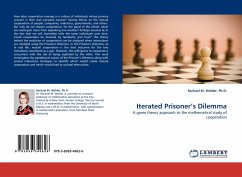How does cooperation emerge in a culture of individuals whose primary concern is their own personal success? Society thrives on the mutual cooperation of people, companies, industries, governments, and others. But why do we choose cooperation, for the good of the whole, when we could gain more from exploiting one another? Perhaps answers lie in the fact that we will interrelate with the same individuals over time. Could cooperation be fostered by familiarity and trust? The theory behind the evolution of cooperation can be analyzed when interactions are modeled using the Prisoner's Dilemma. In the Prisoner's Dilemma, as in real life, mutual cooperation is the best outcome for the two individuals considered as a pair. However, the willingness to cooperate is concurrent with the risk of being exploited by the other. This work investigates the paradoxical nature of the Prisoner s Dilemma along with several interaction strategies to identify which would create mutual cooperation and which would lead to societal destruction.
Bitte wählen Sie Ihr Anliegen aus.
Rechnungen
Retourenschein anfordern
Bestellstatus
Storno








